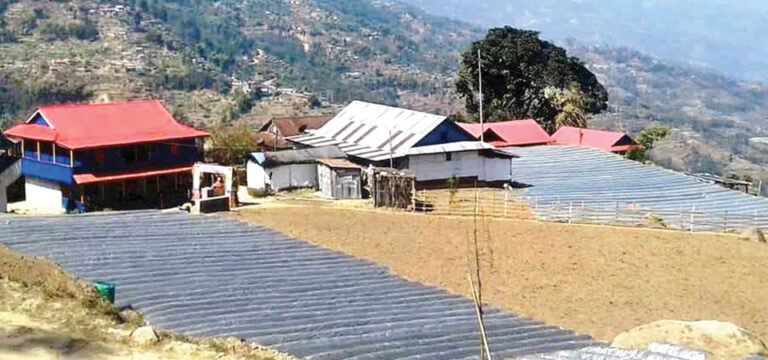
Farmers of Falgunanda Rural Municipality-4, Chillingden of Panchthar have been cultivating Habanero Chilli popularly known in Nepal as Akbare Khursani using mulching plastic.
The attraction of farmers towards the use of this modern technology is also increasing as they know that it will greatly simplify the traditional complex farming system.
More than 400 farmers in Chillingden, which is a pocket area of Akbare, have been planting chillies in mulching plastic for the past three years.
Akbare is being cultivated using mulching plastic technology on about 4,000 ropanis of land in Chillingden. Farmer Nisha Nembang said that such cultivation increased the production by 20 per cent and reduce the cost of weeding.
Chillis planted in mulching plastic start giving yield one month earlier than those planted in the traditional system.
The process of covering the soil with plastic is called ‘mulching plastic’, said Sagar Bista, chief of the Agricultural Knowledge Centre.
This helps to keep the soil moist for a long time by preventing groundwater from evaporating. The gas of manure mixed in the soil is not allowed to escape.
Due to this there is no need of more fertiliser. In winter, the soil is warmed up and proper temperature is maintained and more water than required is not allowed in the rainy season. There is no need of weeding as weeds do not grow.
Leading farmer Tarabir Nembang said that he learned about this multi-purpose scientific technology after watching it on television’s agriculture programme.
Farmers of Chillingden have been planting Akbare since mid-March to get the produce in August.
In view of the winter in the Chillingden area at the time of plantation, the soil is heated by mulching plastic for two weeks.
After that, farmers plant Akbare seedlings by making holes in the plastic. At present, the farmers of Chillingden are busy irrigating by planting Akbare in mulching plastic.
The farmers of Chillingden cultivate Akbare in around one to 35 ropanies of land as their main source of income.
Farmers here make a profit by selling Akbare for up to Rs. 100,000 per ropani of land.
Akbare gives maximum benefit compared to other crops even when planted on a small plot of land, said farmers.
Farmer Kahar Singh Nembang said that he has been cultivating Akbare for the last 15 years on the same piece of land.
The local Sirijanga Small Farmers’ Agricultural Cooperative helps in the promotion of Akbare farming as well as marketing.
Cooperatives buy chillies from farmers reaching their houses at an average price of Rs. 200 per kg. The farmers of Chillingden have been earning up to Rs. 20 million annually by selling only Akbare chillies.
Chief of Agriculture Knowledge Centre Bista said that the Centre had provided a grant of Rs. 2.2 million for promotion of Akbare farming of Chillingden.
Source : TRN,






